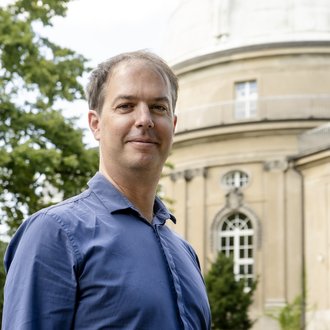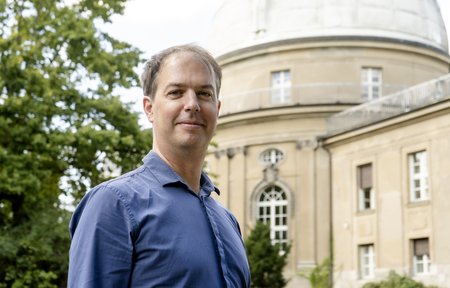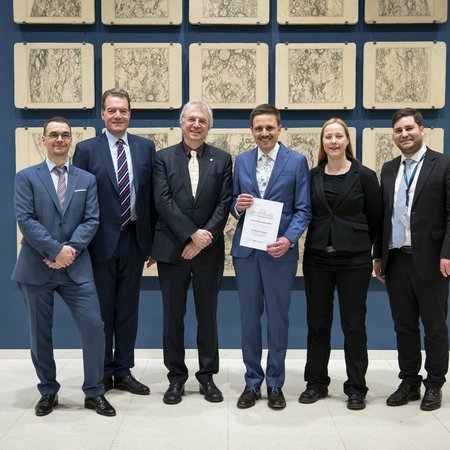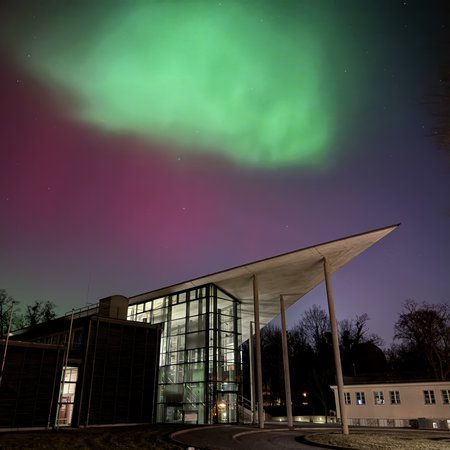Bessel Award for Dr. Alexis Rouillard
The Alexander von Humboldt Foundation has awarded the prestigious Friedrich Wilhelm Bessel Research Award to Dr. Alexis Rouillard, researcher at the Astrophysics and Planetology Research Institute in Toulouse to deepen his research on solar winds at AIP.
The Friedrich Wilhelm Bessel Research Award is granted annually by the Alexander von Humboldt Foundation to 20 internationally renowned scientists and scholars from abroad. Named after the distinguished German astronomer and mathematician Friedrich Wilhelm Bessel, the prize is funded by the German Federal Ministry of Research, Technology and Space
“Dr. Rouillard’s expertise complements our strengths in heliophysics. Together, we aim to advance our understanding of the dynamic atmospheres of stars” says Prof. Dr. Carsten Denker, head of the Solar Physics section at AIP.
“The excellent data obtained by the unique ground-based and spaceborne instrumentation operated by AIP will allow me to test different theories on the formation mechanisms and acceleration processes behind stellar winds, storms, and their associated high-energy particles.” says Dr Alexis Rouillard.
Alexis Rouillard is leading the space weather program in France and is the science director of the French Space Plasma Data Center. Currently based in Toulouse, Dr Rouillard will join AIP for a year to conduct top-tier research in the Solar Physics section of the Stellar, Solar and Exoplanetary Physics branch at AIP. His work aims to deepen understanding of the physics behind solar wind formation, while fostering collaboration with the institute’s solar and stellar physics teams. He plans to leverage advanced fluid and kinetic numerical models of space plasmas, developed in part during his recent ERC consolidator project.
Stellar winds, such as the solar wind, shape the long-term evolution of stars and influence planetary habitability, including conditions on Earth. While they create the Aurora Borealis, they can also disrupt satellites, power grids, and communications. In his research, Alexis Rouillard sets out to understand a broad range of solar phenomena by exploiting jointly imaging of the solar atmosphere and in situ measurements of the escaping particles and fields. With his team, he has developed advanced kinetic and fluid numerical models such as ISAM and HELIOCAST to simulate solar wind formation and propagation in the inner heliosphere. His advanced modelling work has recently provided the first consistent theoretical explanation of the origin of transient solar wind structures, showing how magnetic reconnection processes generate jets and flux ropes that power the solar wind. These findings align with recent data taken from NASA’s Parker Solar Probe and ESA’s Solar Orbiter mision, revealing the solar wind to be far more dynamic than previously believed.
At AIP Alexis Rouillard plans to significantly advance the knowledge of solar wind formation and variability, reshaping understanding of this stellar phenomenon.
Further information
Humboldt Website about the Bessel award: https://www.humboldt-foundation.de/en/apply/sponsorship-programmes/friedrich-wilhelm-bessel-research-award
ERC consolidator project Slow Source http://slow-source.irap.omp.eu https://cordis.europa.eu/article/id/460606-unravelling-the-secrets-of-solar-wind?WT.mc_id=exp
Plasma physics data center https://cdpp.irap.omp.eu
Space Weather Research and Services: https://meteo-espace.irap.omp.eu
Images
Dr Alexis Rouillard
Big screen size [1000 x 640, 100 KB]
Original size [4923 x 3155, 1.4 MB]




